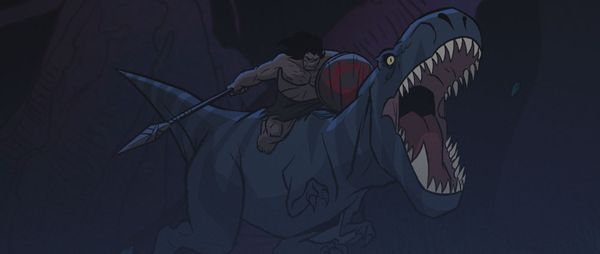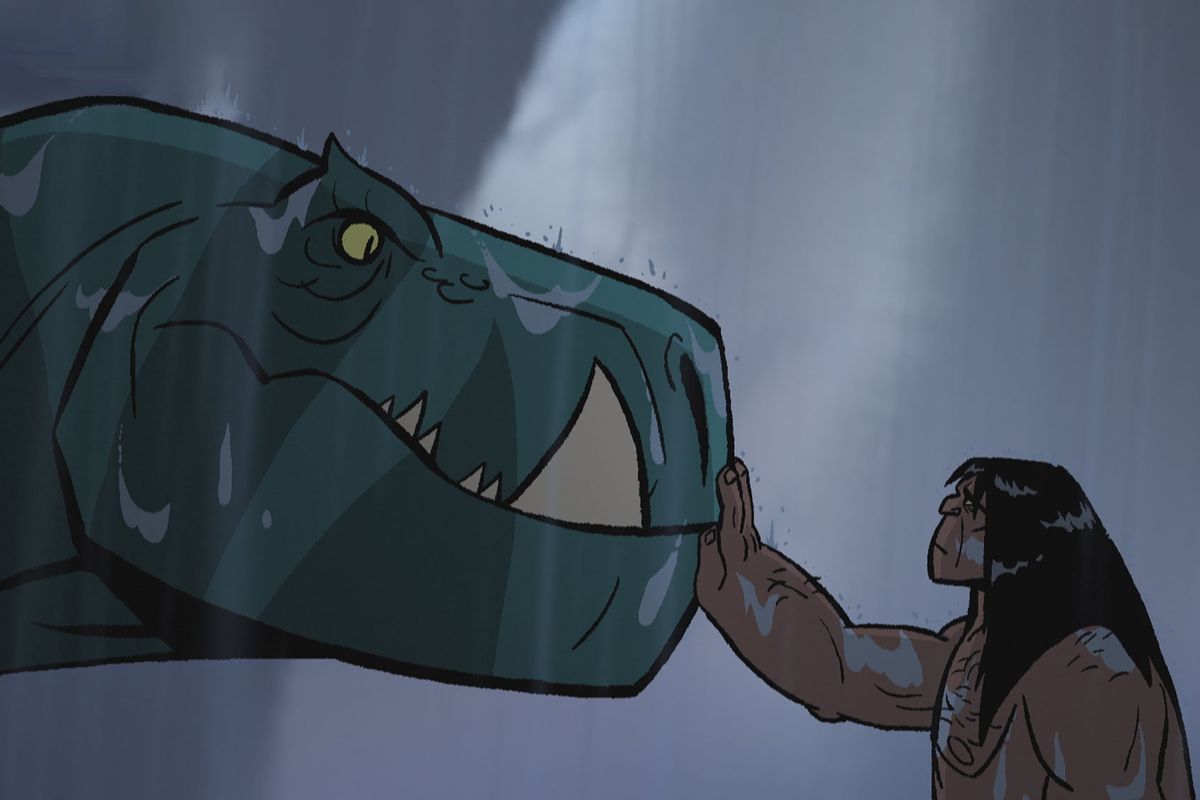It's strange to remember that "Primal" creator Genndy Tartakovsky broke into the animated mainstream more than two decades ago with "Dexter's Laboratory." Tartakovsky helmed several titles in the years between, including "Star Wars: Clone Wars," "Sym-Bionic Titan" and "Samurai Jack," but stylistically speaking "Dexter" and "Primal" are precise opposites.
"Dexter" is family-friendly, bright, and revolves around a title character who talks a mile a minute. "Primal" is gory, brutal and drenched in a bloody earth-toned color palette. It ran for 10 episodes before its protagonist, Spear (Aaron LaPlante) uttered a single word. He and his partner Fang never needed speech to understand each other. Spear is a knuckle-dragging Neanderthal with a heart of gold, and Fang's a Tyrannosaurus rex who cares about Spear enough to refrain from eating him.
Adding another human to their traveling band, an escaped enslaved woman named Mira (Laëtitia Eïdo) brought language into their world, along with advancements like food preparation and a bow and arrow. Her entry also fundamentally changes the show from a visually stunning, wordless survival epic into the most wonderfully unconventional tragic love story on TV. Just not in the way one might assume.
The Emmy-winning "Primal" established its fable about a pair of tragedy survivors banding together against a supernaturally savage world over 10 riveting episodes that defy the common approach to narrative. And Tartakovsky's inspiration was simple. "How do you deal with grief? You can't speak," he explained at a Television Critics Association press conference held earlier this year. "You don't have the words to communicate your suffering. . . . I think it creates a language of its own."
Spear watched his mate and children get eaten by the same enormous T. Rex that devoured Fang's young and would have killed her as well if the caveman hadn't intervened. Their first season adventures venture far from that horror, with each discrete story translated through Spear and Fang's movements through their cruel, fantastic world. Steadily they build a shared understanding of each other before eventually proving they refuse to live without each other.
""How do you deal with grief? You can't speak," Tartakovsky said.
The beauty in that transcends romantic expectation, trading that feeling for something more profound, a feeling people are willing to draw blood to maintain.
One might characterize it as a human need. But that leaves out the dinosaur, who is equally driven, passionate, and loyal to the hunched-over Neanderthal watching her back with a weapon.
Mira's addition and her abduction at the end of the finale kick off a serialized quest in the second season. Desperate to find her, Spear and Fang make their way across the sea, with Spear ensuring Fang stays fed, as always. But the primacy of their bond remains the same. Recovering Mira isn't a mission driven by chivalry or romance, but out of a need to restore the family Spear and Fang are building. The dinosaur wants to rescue her as badly as the man.
 Primal (Courtesy of Adult Swim)
Primal (Courtesy of Adult Swim)
Theirs is not a conventionally acceptable relationship, as they discover when they wash ashore in separate places in an unfamiliar country where dinosaurs and human beings roam, the latter resembling 3rd or 4th century Celts. Spear is taken in by a village, Fang by a fellow predator. Their unexpected reunion forces them to choose either the fellowship of their own kind, or their interspecies family unit. Merging both worlds is impossible.
"I think when I watch things that are more visual . . . [I] have a better reaction to it," Tartakovsky said. He went on to explain that he still loves dialogue, but that his discovery with "Primal" "was that people started to pay attention more. . . . If you turn away, you're going to miss everything. And I think it focused people in, and because this show is so intense, it drew you in more."
Removing language also draws the eye toward what characters do rather than what they say. Mira speaks an actual dialect – ancient Arabic, according to Tartakovsky – as does the village leader in the new season. It doesn't matter that we don't know what they're saying, because we comprehend his intent, just as we understand the painful cost of Spear's loyalty to Fang, and vice versa, without either having to say a thing.
New episodes of "Primal" air Thursdays at midnight on Adult Swim, and stream Fridays on HBO Max. Watch a trailer for Season 2, via YouTube.



Shares